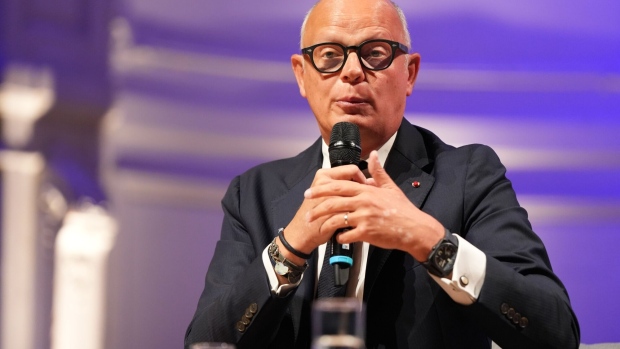Jun 26, 2024
Even Macron’s Closest Allies Fear His Brand Is Toxic
, Bloomberg News

(Bloomberg) -- The day after Emmanuel Macron stunned France by calling a snap election, an uncomfortable truth emerged at an emergency meeting of top government press officials: they had to manage a deeply unpopular president in what had effectively become a referendum on his leadership.
The Élysée’s heads of communication admitted they had no polls or data to suggest candidates should publicly align themselves with Macron to retain their seats, according to three people who attended the June 10 gathering and spoke on the condition of anonymity. Not only had Macron sprung an unwelcome surprise on most of his closest aides, his brand was feared to be toxic.
The president is considered such a liability that dozens of lawmakers who joined him in the very early days, as he built his centrist party from scratch, don’t want him anywhere near the stump.
Even once loyal allies — heavyweights like Finance Minister Bruno Le Maire, Interior Minister Gérald Darmanin and Prime Minister Gabriel Attal — are keeping their distance.
The problem of how to make the 46-year-old leader keep a low profile has become more pressing as his behavior grows erratic. Just this week he spoke to the nation in a nearly two-hour long podcast interview, warning of a “civil war” should the far-right and or the leftist bloc prevail. His main rival, Marine Le Pen, dismissed the comments as “scaremongering” that doesn’t work with voters.
The latest polls, showing her National Rally party’s lead widening, support the argument that his tactics are failing.
Two weeks on from his rash announcement, most pro-government candidates have not included Macron’s image in their campaign posters or fliers. And as they fan out across their constituencies, they do not want him to join them.
“Yes, there is a rejection of the president,” said Édouard Philippe, who served as prime minister in an early Macron cabinet, summing up the mood on BFMTV.
The predicament was a long time in the making.
While Macron’s quick rise from disruptor to president in 2017 was marked by widespread celebrations, the honeymoon was short lived. His top-down leadership style ultimately weakened his own party, and has meant that many French people blame him for everything they believe is wrong in the country. It hasn’t helped him shake a perception that he is aloof and out of touch, either.
With Macron occupying the broad center of French politics, many voters now appear ready to give the fringes a shot.
A person close to Macron insisted that it’s normal for many candidates not to use his image, saying the election is about the parliament not the presidency. The person acknowledged the possibility of defeat but added that only dictators don’t take risks.
The president has vowed, no matter how badly a beating he gets, to stay on until his term ends in 2027, though some observers are beginning to question that assumption given how unpredictable he has been.
Should Macron limp on, he will likely end up responsible only for foreign affairs and defense. The prime minister would be in charge of domestic issues including policing and fiscal policy — and if Le Pen secures a majority of seats, that person will be her right-hand man, Jordan Bardella.
Markets have been spooked by the upheaval and both of Macron’s two living predecessors — right-wing Nicolas Sarkozy and Socialist Francois Hollande — have slammed him for the chaos he unleashed. He remains steadfast in his belief that not only was it the right decision to call a snap vote after his party suffered a crushing defeat in the European Parliament elections but also that there was no other choice.
Macron believes the government was set to collapse in the autumn anyway because of a no confidence motion widely announced by the opposition and insists that the legislative ballot will “clarify” matters.
While it came as a shock, the move had been discussed in Parisian political circles since 2022 when Macron won a second term but failed to gain an outright majority in the National Assembly.
“We all knew there was that sword of Damocles hanging over our heads,” Eleonore Caroit, an outgoing senior lawmaker from Macron Renaissance’s party, said in an interview. “We just didn’t expect it to fall so quickly.”
When it fell, Attal and Foreign Minister Stéphane Séjourné were among those who urged Macron to stay in the background, according to people familiar with the private conversations.
The campaign, they argued, must be very different from the EU election and the previous legislative vote, in which Macron had thrown all his political weight behind government-linked candidates.
While Macron listened and understood, he can’t help himself, according to the people.
The Élysée continues to reach out to candidates to offer political support. A pro-Macron lawmaker who spoke on condition of anonymity said someone recently called him from the palace to suggest sending a senior minister to help him campaign.
The lawmaker expressed thanks for the proposal — but politely declined.
Get Bloomberg’s coverage of the French election in your inbox by signing up to our newsletter, The Paris Edition. Terminal users can sign up here. If you’re reading this online, this is the link you need.
©2024 Bloomberg L.P.







